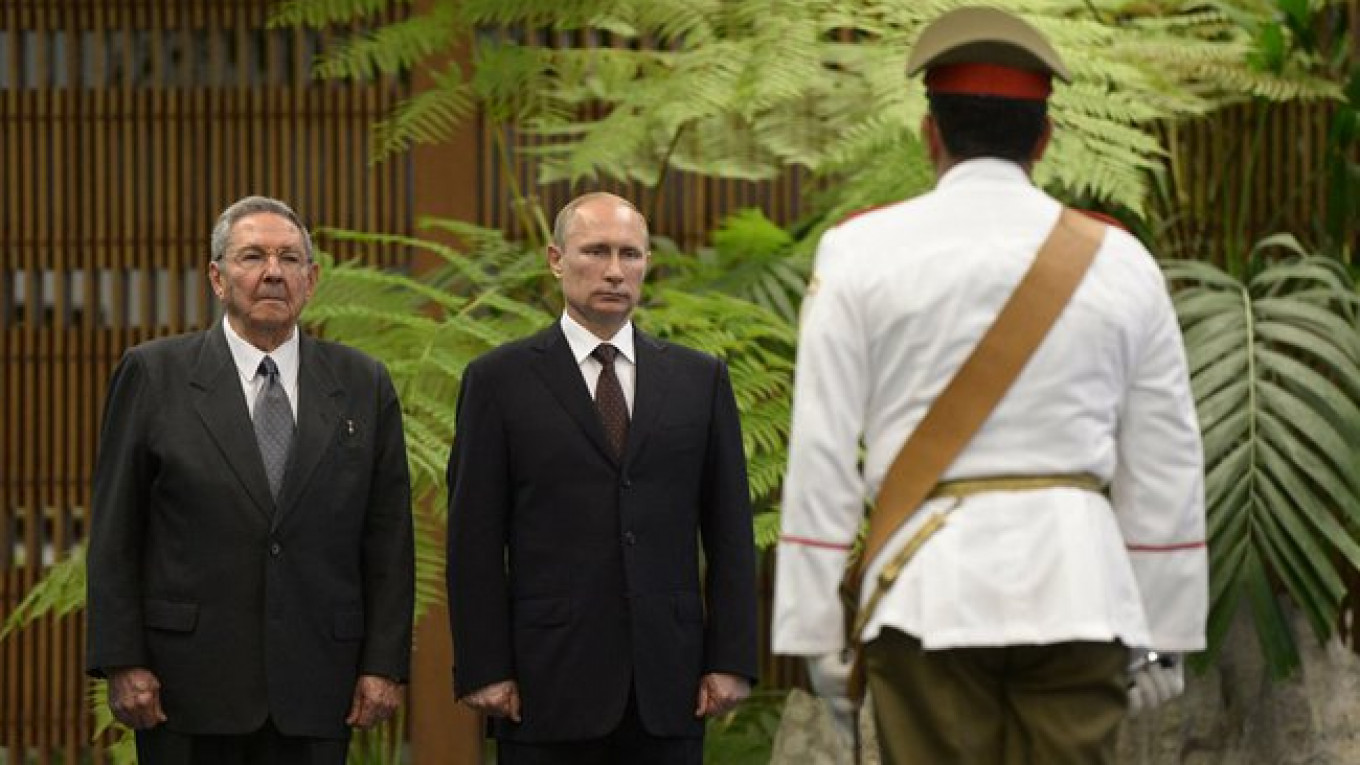HAVANA — President Vladimir Putin pledged to help revive Cuba's struggling offshore oil exploration at the start of a six-day tour of Latin America as Russia aims to reassert its influence on the communist-ruled island.
Putin was joined in Havana by ally and head of state oil company Rosneft, Igor Sechin, to finalize a deal to explore for oil off Cuba's northern coast.
Putin also promised to reinvest $3.5 billion of Cuban debt with Russia into development projects on the island, part of a deal in which Russia forgave 90 percent of Cuba's debt, or almost $32 billion, most of it originating from Soviet loans to a fellow communist state.
Both measures inject much-needed foreign investment into Cuba and demonstrate an act of defiance against the U.S., which maintains a 52-year-old economic embargo that effectively shuts out many Western companies from doing business in Cuba.
"We will provide support to our Cuban friends to overcome the illegal blockade of Cuba," Putin said Friday.
Putin's journey to the back yard of the U.S. comes at a time when he is under pressure from the West to help restrain pro-Russian separatists in Ukraine and urge them to find a negotiated solution.
Sechin is one of the Russian executives the U.S. has targeted for economic sanctions over the Ukraine crisis. Washington has blacklisted individuals believed to be part of Putin's inner circle, and Sechin is among the most influential people in Russia.
On his first stop in Cuba, the Cold War ally of the former Soviet Union situated only 145 kilometers from the U.S., Putin met with former President Fidel Castro and current President Raul Castro before receiving the Medal of Jose Marti, Cuba's highest decoration.
Fidel Castro, 87, stepped down in favor of his brother for health reasons in 2008 after 49 years in power. For an hour he and Putin discussed international affairs, the global economy and Russian-Cuban relations, the Kremlin said.
Any major oil find would radically improve Cuba's economic trajectory.
Cuba produces about 55,000 barrels per day, through aging onshore wells and imports about 110,000 bpd on favorable terms from socialist ally Venezuela.
Following a number of foreign companies whose wells have all come up dry, Russian oil company Zarubezhneft last year began drilling in Cuba's Boca de Jaruco area. That project has been suspended. Zarubezhneft also has been helping Cuba extract from existing onshore wells.
An aide to Putin in Moscow said on Thursday that Zarubeznheft would sign a new deal in Cuba along with Rosneft, but in the end only Rosneft was present.
"Developing new blocks on Cuba's offshore shelf is [expected] in the very near future," Putin said.
See also:
A Message from The Moscow Times:
Dear readers,
We are facing unprecedented challenges. Russia's Prosecutor General's Office has designated The Moscow Times as an "undesirable" organization, criminalizing our work and putting our staff at risk of prosecution. This follows our earlier unjust labeling as a "foreign agent."
These actions are direct attempts to silence independent journalism in Russia. The authorities claim our work "discredits the decisions of the Russian leadership." We see things differently: we strive to provide accurate, unbiased reporting on Russia.
We, the journalists of The Moscow Times, refuse to be silenced. But to continue our work, we need your help.
Your support, no matter how small, makes a world of difference. If you can, please support us monthly starting from just $2. It's quick to set up, and every contribution makes a significant impact.
By supporting The Moscow Times, you're defending open, independent journalism in the face of repression. Thank you for standing with us.
Remind me later.


